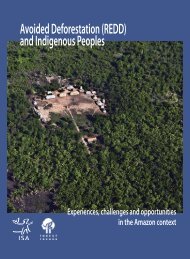BASELINE STUDY 5, Thailand - Forest Trends
BASELINE STUDY 5, Thailand - Forest Trends
BASELINE STUDY 5, Thailand - Forest Trends
Create successful ePaper yourself
Turn your PDF publications into a flip-book with our unique Google optimized e-Paper software.
Elected Tambon Councils hold legal authority to develop and implement plans for the management and conservation<br />
of all natural resources within their administrative territories. For example, small-scale forest-lands<br />
are allocated to the local TAOs for reforestation and planting of trees (mostly teak and eucalyptus) (FAO<br />
2009:30). TAOs include both legislative and executive branches. FAO (2009:32) notes that there is generally<br />
little Tambon Council support for local people to market forest products or to establish community-based<br />
commercial forest product enterprises (e.g. through the 1 tambon/1 product program), even though promoting<br />
local entrepreneurship is in the interests of the TAO authorities. The issue may relate to a lack of knowledge of<br />
the sector within the tambon councils, and/or that TAOs have prioritized other more lucrative local development<br />
initiatives.<br />
Village Authorities: Village political administration includes the village headman (phu yai ban), two assistant<br />
village headmen and the village committee. Garden et al. (2011) report than in 2005, two thirds of <strong>Thailand</strong>’s<br />
63 million citizens lived in villages. Ten to twenty villages usually comprise a tambon. Village-level institutions or<br />
small clusters of villages would be most directly involved in community forest management initiatives in <strong>Thailand</strong>.<br />
Ministry of Industry<br />
Along with the Ministry of Commerce, the Ministry of Industry helps to promote forest-based industries for<br />
both domestic markets and export. The Ministry of Industry works on standardisation for Thai industries, including<br />
forestry. For example, there is an Office of National Standard under the Ministry of Industry that has<br />
established a forest certification committee. The Director of the MNRE’s FIO is also on the board of the Ministry<br />
of Industry’s <strong>Forest</strong> Certification Committee.<br />
Ministry of Commerce<br />
Along with the Ministry of Commerce, the Ministry of Industry helps to promote forest-based industries for<br />
both domestic markets and export.<br />
Customs Department is responsible for the legality of wood imports and export. Customs officials have the responsibility<br />
of checking the customs forms (filled out and available online) and collecting the appropriate tax<br />
fees for the imported and exported wood items. If any irregularities are encountered, the RFD and any other<br />
responsible agencies are contacted.<br />
National Economic and Social Development Board (NESDB)<br />
The NESDB prepares and promotes the National Economic and Social Development Plans on a five-year cycle,<br />
formulates the policies to implement the plans and assesses the progress of forest development programmes<br />
to ensure their consistency with the plan. The current NESDP runs from 2007-2012.<br />
© EU FLEGT Facility, <strong>BASELINE</strong> <strong>STUDY</strong> 5, <strong>Thailand</strong>: Overview of <strong>Forest</strong> Law Enforcement, Governance and Trade, July 2011<br />
This Action is funded by the European Union and the governments of Finland, France, Germany, the Netherlands, Spain and the UK. The views expressed herein<br />
can in no way be taken to reflect the official opinion of the European Union.<br />
www.euflegt.efi.int<br />
50
















